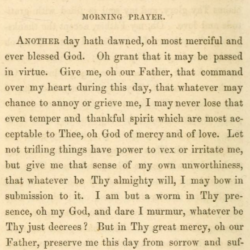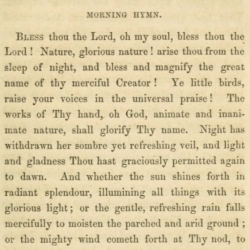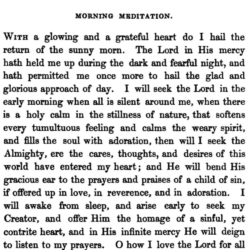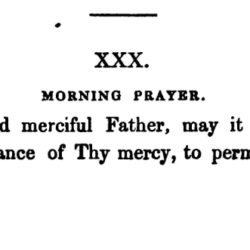Contributor(s): Shared on: 13 May 2023 under the Creative Commons Zero (CC 0) Universal license a Public Domain dedication Categories: Tags: | Contribute a translation | Source (English) |
|---|
|
Concluding supplication for every morning. | |
Almighty Father,
may it please Thee to permit this day
to pass innocently,
sacredly,
acceptably to Thee. | |
Grant me Thy Holy Grace,
that I may be enabled
to resist any unlooked-for temptation,
strength to give up inclination and time if required,
with cheerfulness and promptness;
wisdom to cultivate and improve the talents
Thou hast so mercifully bestowed on me. | |
Enable me, oh blessed Lord,
to remember and attentively to perform
my domestic duties.
Let not my favourite pursuits
occupy my mind so much
as to make me forget them,
or turn my thoughts from Thee.
In all things, oh merciful Father,
permit me to remember Thee. | |
Guard me
from the sins I committed yesterday,
whether secret or presumptuous. | |
Preserve me
from all ill-temper,
irritation,
and impatience,
from too violent or foolish mirth,
and from that depression
which bids me sorrow without a cause. | |
Endow me with Thy Holy Spirit, oh Lord,
that sin may not gain dominion over me,
neither this day nor evermore. | |
“Search me, oh God, and know my heart,
try me, and know my thoughts,
and see if there be any wicked way,
and lead me in the life everlasting.” (Psalm 139:23-24) —
Amen. |
“Concluding supplication for every morning” by Grace Aguilar was published posthumously by her mother Sarah Aguilar in Essays and Miscellanies (1853), in the section “Sacred Communings,” pp. 207-208. In the UK edition of Sacred Communings (1853) the prayer appears with small variations of spelling and punctuation on pages 87-88. Source(s)
 Grace Aguilar (2 June 1816 – 16 September 1847) was an English novelist, poet and writer on Jewish history and religion. Although she had been writing since childhood, much of her work was published posthumously. Among those are her best known works, the novels Home Influence and A Mother's Recompense. Aguilar was the eldest child of Sephardic Jewish refugees from Portugal who settled in the London Borough of Hackney. An early illness resulted in her being educated by her parents, especially her mother, who taught her the tenets of Judaism. Later, her father taught the history of Spanish and Portuguese Jews during his own bout with tuberculosis which had led the family to move to the English coast. After surviving the measles at the age of 19, she began to embark on a serious writing career, even though her physical health never completely recovered. Aguilar's debut was an anonymous collection of poems, The Magic Wreath of Hidden Flowers. Three years later she translated Isaac Orobio de Castro's Israel Defended into English at her father's behest. Later her The Spirit of Judaism drew interest and sales in both Britain and the United States after being published in Philadelphia by Isaac Leeser. He added a preface to the work elucidating his differences with her, the first of many clashes her work would have with mainstream Jewish thought. In the 1840s her novels began to attract regular readers, and Aguilar moved back to London with her parents. Despite her success, she and her mother still had to operate a boys' Hebrew school to stay solvent, which she resented for the time and energy it took from her writing. In 1847, she became ill again with a spinal paralysis which she did not let prevent her from visiting her brother in Frankfurt. Her health worsened and she died there that September. Aharon Varady (M.A.J.Ed./JTSA Davidson) is a volunteer transcriber for the Open Siddur Project. If you find any mistakes in his transcriptions, please let him know. Shgiyot mi yavin; Ministarot naqeni שְׁגִיאוֹת מִי־יָבִין; מִנִּסְתָּרוֹת נַקֵּנִי "Who can know all one's flaws? From hidden errors, correct me" (Psalms 19:13). If you'd like to directly support his work, please consider donating via his Patreon account. (Varady also translates prayers and contributes his own original work besides serving as the primary shammes of the Open Siddur Project and its website, opensiddur.org.) Read a comment / Leave a comment (moderated) Works of related interest: |





![morning hymn (Blessed art Thou) [version 1] (Grace Aguilar 1853) - cropped](https://opensiddur.org/wp-content/uploads/2023/05/morning-hymn-Blessed-art-Thou-version-1-Grace-Aguilar-1853-cropped-250x250.png)


![morning hymn (father of all) [in illness] (Grace Aguilar 1853) - cropped](https://opensiddur.org/wp-content/uploads/2023/05/morning-hymn-father-of-all-in-illness-Grace-Aguilar-1853-cropped-250x250.png)

![morning hymn (Blessed art Thou) [version 2] (Grace Aguilar 1853) - cropped](https://opensiddur.org/wp-content/uploads/2023/05/morning-hymn-Blessed-art-Thou-version-2-Grace-Aguilar-1853-cropped-250x250.png)


Leave a Reply